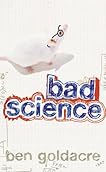 Bad Science by Ben Goldacre
Bad Science by Ben GoldacreMy rating: 4 of 5 stars
The aim of this book is that the reader shall be future-proofed against new variants of bullshit (p.88). With sardonic wit, Goldacre takes aim at the pseudoscience touted in the media that backs up all sorts of farcical claims. From "detox" systems that have no effect on the body but assuage the guilty mind, to the breathtaking lack of substantiation for homeopathic medicine and complementary and alternative medicine (CAM) in general, to high-end cosmetics that imply miracles and contain all sort of impressive sounding ingredients (but that don't truly claim to do anything, because legally these claims would be indefensible), to nutritionism, another field that is big on claims and short on evidence
He makes a rigorous defense of the scientific method because the method demands accountability and control of variables, in order to test what it purports to test. This is where most popular science and layman's science falls short. Quite frankly, we mere members of the public have little interest is carefully assessing testing methods, we want to know the results. It is precisely our lack of interest in the nuts and bolts and how the testing was put together that makes us vulnerable to false claims.
Goldacre wryly notes the religious overtones that accompany to many health claims. Some "detox" programs are basically purification "rituals" (with the emphasis on ritual, rather than purification). "In what we call the Developed Western World, we seek redemption and purification from the more extreme forms of our material indulgence: we fill our faces with drugs, drink, bad food, and other indulgences, we know it's wrong, and we crave ritualistic protection from the consequences…Like so much of the nonsense in bad science, "detox" pseudoscience isn't something done to us, by venal and exploitative outsiders; it is a cultural product, a recurring theme, and we do it to ourselves" (p.14).
Other cures are simply based on faith: "I believe that homeopathic medicine works, therefore it cures me." As with all instances of faith, "true believers" often become incensed when the grounds for their faith is challenged. Their objections are not limited to moral outrage, vitamin magnate Matthias Rath sued Goldacre for libel for challenging Rath's claims that vitamins can cue cancer, and that AIDS does not exist and that "Antiretroviral drugs were poisonous and a conspiracy to kill patients and make money" (p.133). Goldacre laments that this campaign of misinformation has cost so many lives.
This is not to say that the medical and pharmaceutical establishment does not make mistakes. In fact, he recounts in detail how pharmaceutical producers have gone to great lengths to play up the benefits of their products while withholding or distorting evidence about adverse outcomes (p.149). It is telling that drug companies spend 14% of their budget on R&D, and 31% on marketing and administration (p.150).
The final section on the book deals with "The Media's MMR Hoax" that arose based on a now-debunked 1998 study by Andrew Wakefield. Goldacre concludes that studies that have looked at the MMR vaccine and incidence of autism have not found any causal link. The scandal, however, was hugely successful because it used emotional engagement through first person testimonials. By suggesting that there might be a link between autism and the vaccine, it preyed on people's fear and guilt about potentially doing unintentional harm to their child.
One key piece of information that I will take away from this book is that the Cochrane Collaboration produces systematic summaries of the research literature on health care research (p. 57). Meaning that whenever the purveyor of some miracle cure is claiming that "no research has been done," Cochrane just might have compiled that research.
http://www.cochrane.org/
The site, however, is not exhaustive. For example, a friend recently sent me an email about DCA (dichloroacetate) as a cure for cancer. Cochrane does not address it.
These kinds of stories pop up in the media all the time and people get worked up about them. Often times the headlines are misleading when journalists go for impact over accuracy (by stating figures in terms of relative risk instead of giving natural frequencies, p. 187). Goldacre notes that science stories printed in the mainstream media are often not written by science journalists, thus increasing the risk of getting the information wrong.
Last week, for example, the media were all over the story about how cell phones increase risk for brain cancer. The fact that brain cancer rates have remained stable while cell phone use has increased exponentially, is somewhat of a mystery. Not being able to separate the fact from the fiction can be dangerous for your health.
View all my reviews


No comments:
Post a Comment